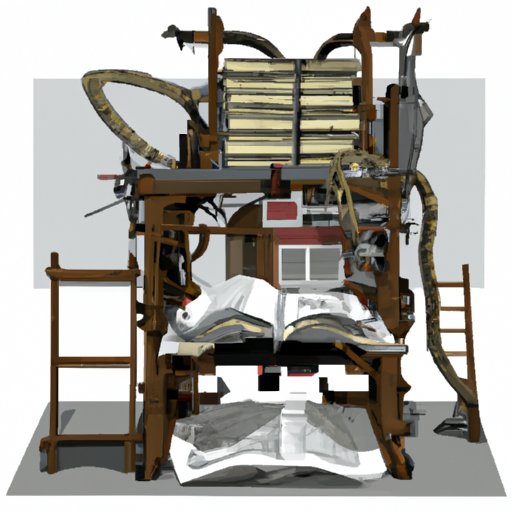Introduction
The printing press is a device that has been used since the 15th century to produce multiple copies of documents quickly and efficiently. It was invented by Johannes Gutenberg in 1439 and revolutionized the way information was spread throughout the world. This article seeks to explore the history and purpose of the printing press and analyze how it has impacted society.

Exploring the History and Purpose of the Printing Press
The origins of the printing press can be traced back to the Chinese invention of movable type in the 11th century. This technology allowed for the creation of multiple copies of documents quickly and with relative ease. However, it wasn’t until Johannes Gutenberg came along in 1439 that the printing press as we know it today was created. He developed the first printing press in Europe, which allowed for the mass production of books and documents.
Gutenberg’s invention was revolutionary, as it allowed for the quick and efficient spread of information. His invention enabled Europeans to have access to books and documents that were previously unavailable due to their rarity and cost. As a result, Gutenberg’s printing press had a profound impact on mass communication, as it allowed for rapid dissemination of ideas and knowledge.

Understanding the Societal Benefits of the Printing Press
The invention of the printing press had a number of societal benefits. One of the most important benefits was the increase in availability of books. Before the printing press, books were rare and expensive, making them inaccessible to the average person. However, with the invention of the printing press, books became much more affordable and widely available. This allowed people to access knowledge and ideas that were previously out of reach.
Another benefit of the printing press was the expansion of knowledge and ideas. With the ability to print multiple copies quickly and cheaply, authors and publishers were able to share their ideas with a much wider audience. This allowed for the spread of new and innovative ideas, which had a tremendous impact on society.

Analyzing the Technological Advancements of the Printing Press
In addition to its societal benefits, the printing press also brought about a number of technological advancements. One of the most important advancements was the development of new print technologies. These technologies allowed for the faster and more efficient production of documents and books. This allowed for the widespread dispersal of knowledge and ideas at a much faster rate than before.
Another advancement of the printing press was the increase in efficiency and speed. The printing press allowed for the production of multiple copies of documents quickly and with relative ease. This allowed for the spread of information to occur much faster than before, as books and documents could now be printed and distributed quickly.
Investigating the Role of the Printing Press in Spreading Knowledge
The invention of the printing press had a major impact on the spread of knowledge. One of the most important impacts was the increase in access to information. With the ability to produce multiple copies quickly and cheaply, books and documents became much more widely available. This allowed people to access knowledge and ideas that were previously out of reach.
The printing press also had a major impact on education and literacy. With the increased availability of books and documents, public schools began to spring up across the country. This allowed for the expansion of education and literacy, as more people were able to access knowledge and ideas.
In addition, libraries began to appear as a result of the printing press. Libraries provided people with access to books and documents that were previously unavailable due to their rarity and cost. This allowed for the further spread of knowledge and ideas, as people were now able to access information from around the world.
Conclusion
The invention of the printing press had a tremendous impact on society. It allowed for the quick and efficient spread of information, which had a number of benefits. It increased the availability of books, expanded knowledge and ideas, and improved education and literacy. In addition, it brought about a number of technological advancements, such as the development of new print technologies and an increase in efficiency and speed. The printing press has played an integral role in the spread of knowledge throughout the ages and will continue to do so for years to come.
(Note: Is this article not meeting your expectations? Do you have knowledge or insights to share? Unlock new opportunities and expand your reach by joining our authors team. Click Registration to join us and share your expertise with our readers.)
